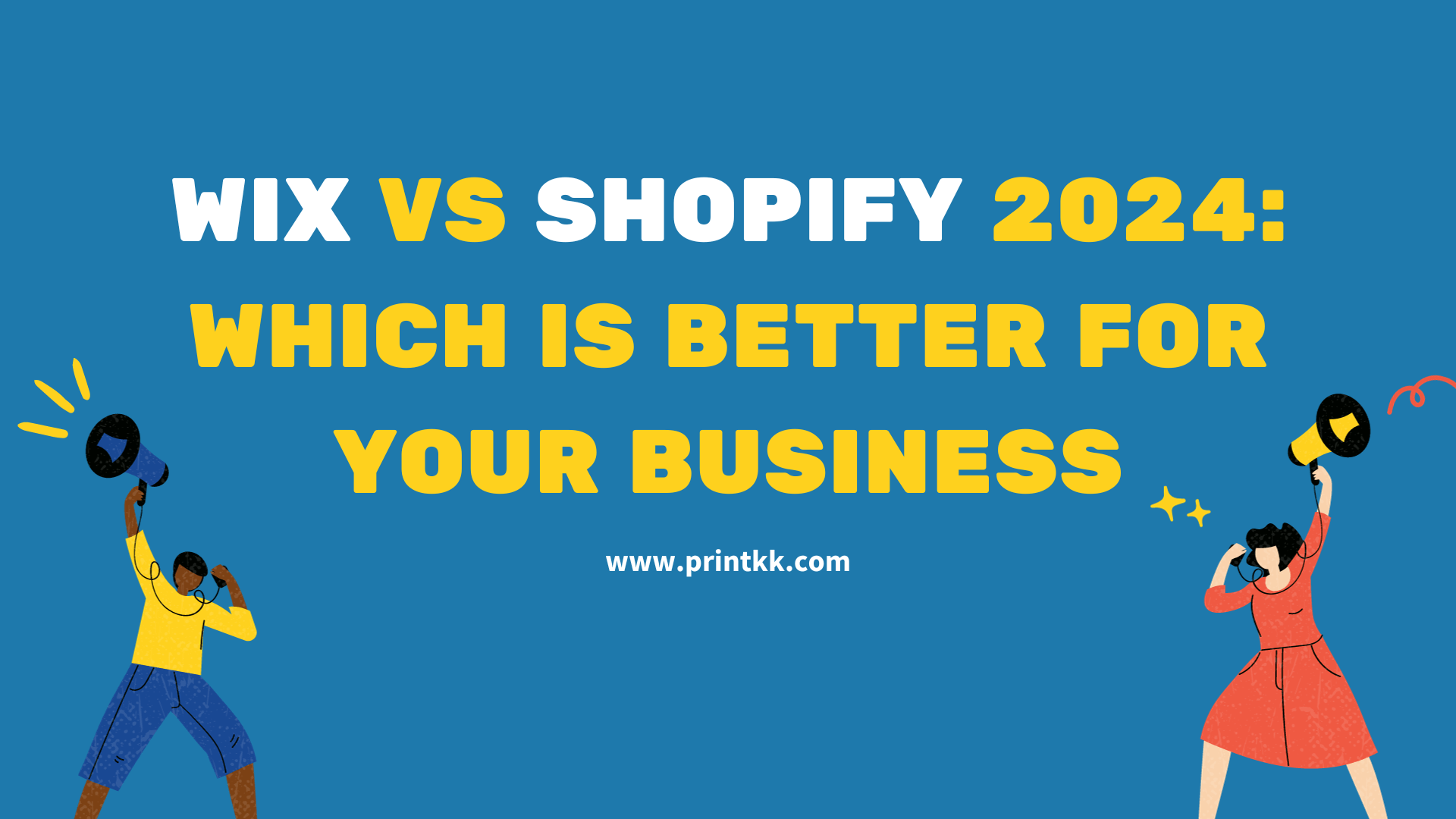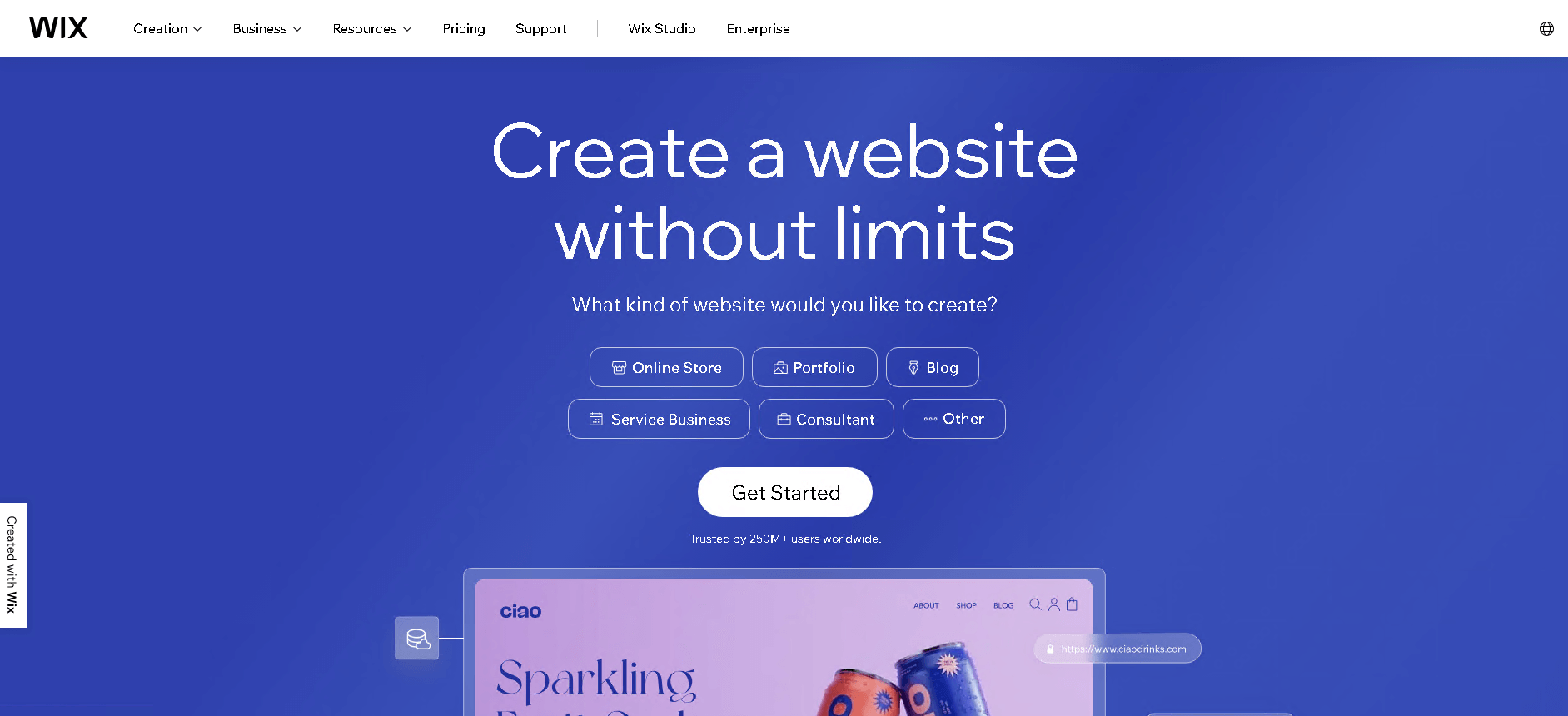
In "Wix vs Shopify 2025: Which is Better for Your Business", we explore the crucial decision of choosing the right e-commerce platform for your venture. This guide delves into the features, usability, and scalability of both Wix and Shopify, offering a clear comparison to help entrepreneurs, small business owners, and creatives make an informed choice for their online success in 2025. Join us in uncovering the ideal platform to elevate your business's digital presence.
What Is Wix?

Have you ever felt inundated by the intricacies of creating and running an online shop? You're not the only one. For many entrepreneurs, designers, and small business owners, the thought of tackling the technical side of e-commerce can be daunting. This is where Wix comes into play as a symbol of ease and effectiveness.
Wix is a cloud-based web development platform that empowers you to create beautiful, professional websites without needing to delve into the nitty-gritty of coding. It's a tool designed for those who crave creativity and functionality but may lack technical expertise. With its intuitive drag-and-drop interface, Wix eliminates the hassle of website creation. You can choose from a vast library of designer-made templates, customize every aspect to fit your brand, and even add advanced features like e-commerce capabilities with ease.
But what truly sets Wix apart is its dedication to offering a comprehensive solution for business owners and creatives alike. Beyond just website building, Wix offers a suite of tools to manage your business online, including print on demand services that allow artists and entrepreneurs to sell custom-designed products without holding inventory. From marketing and SEO to managing bookings and events, Wix provides an all-in-one platform that scales with your needs. Whether you're a solo artist looking to sell your art, a burgeoning brand, or a dropshipper seeking an online presence, Wix offers the tools and flexibility to build a website that aligns with your vision and objectives.
In the world of online commerce, where flexibility and ease-of-use are paramount, Wix stands out as a solution that not only simplifies the process of website creation but also enriches your ability to connect with your audience and grow your business. It's not just about building a website; it's about creating an online extension of your brand that resonates with your customers and supports your growth every step of the way.
What Is Shopify?

In the ever-evolving world of e-commerce, where entrepreneurs and small business owners strive to find a balance between functionality and user-friendliness, Shopify emerges as a robust solution. It's not just a platform; it's a comprehensive ecosystem that caters to the needs of diverse online businesses, from artists and designers to large corporations and dropshippers.
Shopify is a premier e-commerce platform that enables you to effortlessly create and manage an online store. It's designed for those who want to focus on building their brand and selling products without getting bogged down in the complexities of web development and server management. With Shopify, you can launch a store with just a few clicks, choosing from a variety of customizable themes that make your brand stand out.The platform facilitates various sales channels, such as web, mobile, social media, and even physical stores, offering you the versatility to expand your business on multiple fronts.
What distinguishes Shopify is its extensive suite of tools and features designed to address every facet of managing an online store. From inventory management and payment processing to marketing and customer engagement, Shopify provides everything you need to succeed in the e-commerce space. From managing your products and inventory to processing payments and handling shipping, Shopify simplifies these processes with its intuitive interface. The platform additionally provides robust marketing and SEO tools to enhance your store's visibility and draw in more customers. For businesses requiring more advanced functionalities, Shopify offers a wide range of app integrations, enabling you to customize the platform to meet your particular requirements.
For entrepreneurs and business owners seeking a scalable, user-friendly solution for their e-commerce ventures, Shopify stands as a top choice. It's not just a platform for selling products; it's a partner in your business journey, offering the tools and support you need to succeed in the competitive world of online commerce.
Wix vs Shopify: Pros and Cons

Choosing between Wix and Shopify is a crucial decision for anyone aiming to establish or grow their online presence. Both platforms provide distinct benefits and have specific drawbacks. Here's a detailed breakdown of the pros and cons of each to assist you in determining which one aligns best with your business objectives.
Wix Pros
- User-Friendly Interface: Perfect for newcomers, featuring a drag-and-drop editor for effortless website creation.
- Customizable Design Templates: A broad selection of templates fitting various business types and aesthetics.
- Inclusive of Basic E-commerce Features: Adequate for small-scale online shops.
- No Transaction Fees: Lets you retain more of your profits.
- Built-in SEO Tools: Improves online visibility.
Wix Cons
- Limited E-commerce Capabilities for Large Scale Stores: Not ideal for businesses looking to scale up significantly.
- Less Comprehensive App Market: Fewer integrations compared to Shopify.
- Limited Customization for Advanced Users: Can be restrictive for those with technical expertise.
Shopify Pros
- Comprehensive E-commerce Solutions: Excellent for businesses focusing primarily on e-commerce.
- Extensive App Store: Wide range of apps and integrations for additional functionality.
- Scalability: Ideal for growing businesses.
- Advanced Sales Features: Includes capabilities like abandoned cart recovery.
- Strong Community and Support: Extensive resources and a large community for support.
Shopify Cons
- Monthly Fees and Transaction Costs: Can be expensive for small businesses.
- Requires Learning Curve: More complex than Wix, especially for beginners.
- Limited Blogging Capabilities: Not as robust as Wix for content-focused sites.
Wix vs. Shopify: Detailed Comparison
When selecting the appropriate e-commerce platform, deciding between Wix and Shopify can be difficult. Each platform provides distinct features and serves various requirements. Whether you are a budding entrepreneur, a small business owner, a designer, or involved in dropshipping, understanding the nuances of each platform is key to making the best choice for your online venture. In this detailed comparison, we will dive into various aspects such as pricing, templates, features, ease of use, site designs, dropshipping capabilities, integrations, SEO efficiency, payment options, sales channels, shipping and fulfillment, security, and customer support to give you a clearer picture.
| Comparison Aspect | Wix | Shopify |
Pricing and Cost |
Offers a range of pricing plans, including a free option. Generally more affordable for small-scale operations. |
Monthly fees with several tiered plans. Can be more costly, but offers robust e-commerce tools. |
Templates |
Wide variety of customizable templates, more focused on design aesthetics. |
Professional and e-commerce optimized templates, though less variety than Wix. |
Features |
Comprehensive website features with basic e-commerce capabilities. |
Extensive e-commerce features, including advanced options for larger stores. |
Ease of Use |
Extremely user-friendly with a drag-and-drop interface. Ideal for beginners. |
User-friendly, but with a steeper learning curve due to advanced features. |
Site Designs |
Highly customizable and designer-friendly. |
Clean, professional designs with less customization flexibility than Wix. |
Dropshipping |
Supports dropshipping, but with limited options compared to Shopify. |
Robust dropshipping support with extensive integrations like Oberlo. |
Integrations and Apps |
Basic integrations and apps available. |
Extensive range of apps and integrations for enhancing store functionality. |
SEO |
Built-in SEO tools but considered less powerful than Shopify's. |
Strong SEO capabilities and tools for higher search engine visibility. |
Payment Options |
Supports a variety of payment methods, no extra transaction fees. |
Wide range of payment gateways, but includes transaction fees unless using Shopify Payments. |
Sales Channels |
Limited sales channel integrations. |
Supports multiple sales channels including online, social media, and physical locations. |
Shipping and Fulfillment |
Basic shipping features suitable for smaller operations. |
Advanced shipping and fulfillment options, ideal for scaling businesses. |
Security |
Basic security features included. |
High-level security with SSL and compliance features. |
Customer Support |
Good customer support with various channels. |
Excellent, 24/7 customer support with extensive resources. |
This table presents a side-by-side comparison of Wix and Shopify across several critical aspects, helping you to understand how each platform aligns with your specific business requirements.
Which Should You Choose Between Wix and Shopify?
Deciding between Wix and Shopify can seem like a daunting task, given the strengths and unique features of each platform. Your decision will ultimately be influenced by your particular business requirements, technical abilities, and long-term objectives. Here are some important factors to consider to assist you in making your choice:
For Beginners and Design-Oriented Users
If ease of use and design flexibility are your top priorities, Wix could be a better fit. Its user-friendly drag-and-drop interface and extensive selection of customizable templates make it perfect for individuals with limited technical expertise or a keen emphasis on visual appeal.
For E-commerce Focused Businesses
Shopify stands out if your primary goal is to build a robust online store. It offers comprehensive e-commerce tools, advanced sales features, and scalability options that are well-suited for businesses planning to grow or operate at a larger scale.
For Budget-Conscious Users
Consider the costs associated with each platform. Wix can be more budget-friendly, especially for smaller operations, as it offers a range of pricing plans, including a free option. Shopify, while potentially more costly due to its monthly fees and transaction costs, provides extensive e-commerce capabilities that might justify the investment for larger businesses.
For Dropshipping Businesses
Shopify has a stronger reputation in the dropshipping community, mainly due to its extensive integration options and partnerships with platforms like Oberlo, which make managing a dropshipping business more streamlined.
For SEO and Marketing
Both platforms offer SEO tools, but Shopify's are generally considered more robust. This can be a decisive factor if search engine visibility is a key component of your marketing strategy.
For Multi-Channel Selling
If you plan to sell across various channels (online, social media, physical stores), Shopify offers more comprehensive support for multi-channel sales.
User Reviews (Selected Excerpts):
QP_marketnetwork:
"Both are easy to start, compared with WordPress. But, be reminded that Shopify is an eCommerce platform, while Wix has basic features for every purpose. Since you posted in this subreddit, I'll assume that you are going to run a store... then Shopify seems to make more sense. It has offered some useful extensions to help and enhance some features. Yes, overall, it costs more... Anyway, Wix is free, so no harm to take some time and play around."
Importify01:
"Shopify is arguably the best ecommerce platform out there.It includes all the essential features required to launch an e-commerce store. With its highly customizable and user-friendly interface, it caters to various needs effectively. Shopify offers a built in SEO and social media options, which is a great help for both seo and social media marketing. Also there are a lot of Apps from third party that its easy to use. Conversely, Wix offers superior templates, simplifying the website creation process. But again you cannot tweak everything in the template, which means you cannot create a fully customized website. Wix does not have advanced features which are required for ecommerce stores. Shopify is better for beginners as well as for experienced people."
KukuJames:
"For eCommerce, my first preference will be Shopify, second preference is WooCommerce. If you want a business website but have limited resources, go for Wix. Else get it done on WordPress."
Historical_Ad_8264:
"Shopify has poor customer service. No customer service line. Only live chat, which is not helpful. Shopify shuts down stores without warning. If you have issues, you are basically on your own and have to find your own answers."
Ultimately, the choice between Wix and Shopify should be based on how well each platform aligns with your business model, technical expertise, and growth aspirations. Both platforms have their merits, and the best choice varies based on individual business needs and goals.
Conclusion
In conclusion, Wix and Shopify serve distinct purposes in the online business landscape. Wix is suitable for beginners and those prioritizing ease of use and design. It offers a user-friendly interface and diverse templates, making it ideal for small businesses and entrepreneurs looking for a visually appealing online presence. On the other hand, Shopify excels as a robust e-commerce platform. It is ideal for businesses focused on online retail, providing scalability, a comprehensive toolkit, and extensive app integrations. If you aim to grow and manage a large-scale online store, Shopify's advanced features offer the necessary support.
Your decision should align with your specific business needs and goals. If design and simplicity are crucial, Wix is the go-to option. For strong e-commerce capabilities and growth potential, Shopify is the better choice. Both platforms are powerful tools in online business, and the right choice varies based on your unique needs and aspirations.
Ultimately, whether you choose Wix or Shopify, embarking on the journey of building and growing your online presence is an exciting step towards achieving your business goals.
FAQs
How much does it cost to sell on Wix or Shopify?
Wix has a free plan but for e-commerce, prices start at approximately $23/month, lacking selling features in the free tier. Shopify's e-commerce plans begin at $29/month, offering a full set of selling tools from the outset, with additional costs for transactions and add-ons. Wix is initially more affordable, while Shopify provides comprehensive e-commerce capabilities, better suited for established online sellers. Choose based on your business needs and growth plans.
Which is cheaper: Shopify or Wix?
Wix is cheaper for beginners with plans starting from $23/month after a free basic tier, suitable for simple websites without e-commerce. Shopify starts at $29/month, tailored for e-commerce with a comprehensive toolset, but may incur additional fees. Wix is ideal for those on a tight budget, while Shopify offers more value for serious online sellers despite a higher initial cost. Your choice should be based on your e-commerce needs and financial plan.
Which is more customable Shopify or Wix?
Wix offers extensive design customization with a user-friendly drag-and-drop interface, ideal for unique website aesthetics without deep technical skills. Shopify, though less flexible in design, provides robust customization options for the e-commerce experience through apps and integrations, catering to businesses focused on tailored shopping experiences. Choose Wix for design creativity or Shopify for e-commerce functionality, depending on your customization priorities.
Is it better to use Wix or Shopify?
Wix is best for those valuing ease of use and design customization, making it great for small businesses and creatives needing a unique website with less technical complexity. Shopify excels in e-commerce, with advanced sales tools and scalability, ideal for online-focused businesses and high-volume sellers. Your choice should reflect whether you prioritize design flexibility (Wix) or e-commerce strength (Shopify) for your business's online strategy.
Is it hard to switch from Wix to Shopify?
Switching from Wix to Shopify involves a series of manageable steps, with Shopify providing tools to aid the migration, including domain transfer and product data movement. While some technical challenges may occur, particularly in replicating your site's design and features, careful planning or professional help can smooth the transition. It's a practical move for those seeking enhanced e-commerce functionality and growth potential.
Can I have Wix and Shopify at the same time?
Yes, it's possible to use Wix and Shopify together, combining Wix's design capabilities for your main site with Shopify's e-commerce strength for sales. While this dual-platform strategy can offer comprehensive online solutions, it demands extra effort to maintain brand consistency and a seamless customer experience. Planning the roles of each platform—Wix for branding and portfolio, Shopify for the store—is crucial for a cohesive presence.










 Made in USA
Made in USA


 Global Shipping
Global Shipping


























